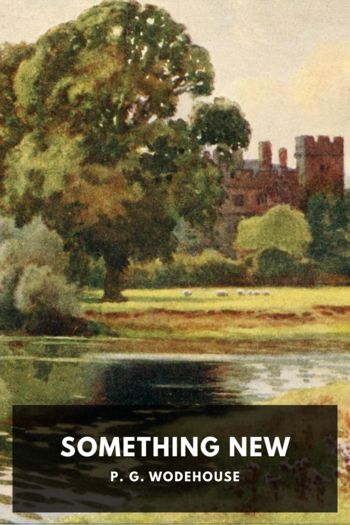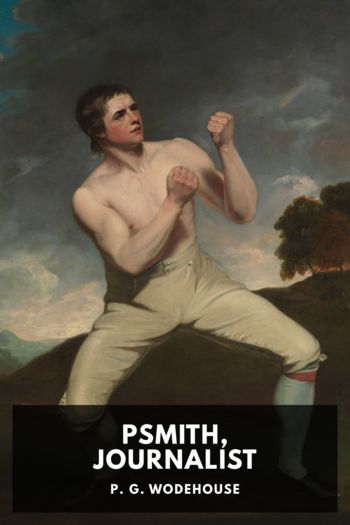Leave It to Psmith by P. G. Wodehouse (best ereader for academics TXT) 📕

- Author: P. G. Wodehouse
Book online «Leave It to Psmith by P. G. Wodehouse (best ereader for academics TXT) 📕». Author P. G. Wodehouse
It was at this point that he discovered that the lights in the hall had been switched off and that the front door was closed and bolted.
IIIIt is the opinion of most thoughtful students of life that happiness in this world depends chiefly on the ability to take things as they come. An instance of one who may be said to have perfected this attitude is to be found in the writings of a certain eminent Arabian author who tells of a traveller who, sinking to sleep one afternoon upon a patch of turf containing an acorn, discovered when he woke that the warmth of his body had caused the acorn to germinate and that he was now some sixty feet above the ground in the upper branches of a massive oak. Unable to descend, he faced the situation equably. “I cannot,” he observed, “adapt circumstances to my will: therefore I shall adapt my will to circumstances. I decide to remain here.” Which he did.
Rupert Baxter, as he stood before the barred door of Blandings Castle, was very far from imitating this admirable philosopher. To find oneself locked out of a country-house at half-past two in the morning in lemon-coloured pyjamas can never be an unmixedly agreeable experience, and Baxter was a man less fitted by nature to endure it with equanimity than most men. His was a fiery and an arrogant soul, and he seethed in furious rebellion against the intolerable position into which Fate had manoeuvred him. He even went so far as to give the front door a petulant kick. Finding, however, that this hurt his toes and accomplished no useful end, he addressed himself to the task of ascertaining whether there was any way of getting in—short of banging the knocker and rousing the house, a line of action which did not commend itself to him. He made a practice of avoiding as far as possible the ribald type of young man of which the castle was now full, and he had no desire to meet them at this hour in his present costume. He left the front door and proceeded to make a circuit of the castle walls; and his spirits sank even lower. In the Middle Ages, during that stormy period of England’s history when walls were built six feet thick and a window was not so much a window as a handy place for pouring molten lead on the heads of visitors, Blandings had been an impregnable fortress. But in all its career it can seldom have looked more of a fortress to anyone than it did now to the Efficient Baxter.
One of the disadvantages of being a man of action, impervious to the softer emotions, is that in moments of trial the beauties of Nature are powerless to soothe the anguished heart. Had Baxter been of a dreamy and poetic temperament he might now have been drawing all sorts of balm from the loveliness of his surroundings. The air was full of the scent of growing things; strange, shy creatures came and went about him as he walked; down in the woods a nightingale had begun to sing; and there was something grandly majestic in the huge bulk of the castle as it towered against the sky. But Baxter had temporarily lost his sense of smell; he feared and disliked the strange, shy creatures; the nightingale left him cold; and the only thought the towering castle inspired in him was that it looked as if a fellow would need half a ton of dynamite to get into it.
Baxter paused. He was back now near the spot from which he had started, having completed two laps without finding any solution of his difficulties. The idea in his mind had been to stand under somebody’s window and attract the sleeper’s attention with soft, significant whistles. But the first whistle he emitted had sounded to him in the stillness of early morn so like a steam syren that thereafter he had merely uttered timid, mouse-like sounds which the breezes had carried away the moment they crept out. He proposed now to halt for awhile and rest his lips before making another attempt. He proceeded to the terrace wall and sat down. The clock over the stables struck three.
To the restless type of thinker like Rupert Baxter, the act of sitting down is nearly always the signal for the brain to begin working with even more than its customary energy. The relaxed body seems to invite thought. And Baxter, having suspended for the moment his physical activities—and glad to do so, for his slippers hurt him—gave himself up to tense speculation as to the hiding-place of Lady Constance Keeble’s necklace. From the spot where he now sat he was probably, he reflected, actually in a position to see that hiding-place—if only, when he saw it, he were able to recognise it for what it was. Somewhere out here—in yonder bushes or in some unsuspected hole in yonder tree—the jewels must have been placed. Or …
Something seemed to go off inside Baxter like a touched spring. One moment, he was sitting limply, keenly conscious of a blister on the sole of his left foot;





Comments (0)